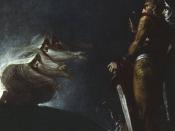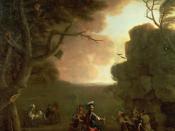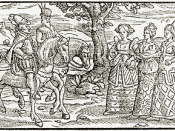Just as any member of today?s society will liken darkness to an evil force, so William Shakespeare uses darkness in Macbeth to symbolize evil in his characters and to establish the mood of the play; all of this contributes to the grand theme of the evil and wickedness of excess ambition. The three witches and Macbeth are all primary illustrations of Shakespeare?s development of character traits through the symbol of darkness. First, the witches? meetings are all in times of darkness and gloom, such as on the Scottish moor during a tempest in Act I, Scene 1. They also meet in a dark cave, an appropriate setting for the witches because of the stereotypical murk and gloom of caves and their likeness to the concept of the underworld where evil broods. The association of witches and hell was commonplace in Shakespeare?s time, thus making them seem all the more evil and ghastly to the reader.
The witches? appearance also contributes to the feeling of their evil nature. Macbeth describes them as being ?secret, black and midnight hags,? which supports the darkness motif through the words ?black and midnight? and characterizes the witches as evil antagonists (IV, 1, 47). Banquo also calls them ?instruments of darkness? after their first prophecy comes true (I, 3, 124). The witches contribute to the overall theme of the evil of ambition by foretelling Macbeth?s dark fate, which is an obstacle he attempts to overcome to reach his self-indulgent goals, but he fails. Macbeth, too, is a prevalent player in Shakespeare?s characterization of darkness as a symbol of evil. As in the blatant statement ?Let not light see my black and deep desires,? the stage is set for the discovery of Macbeth?s corruption (I, 4, 58). Shakespeare goes on to portray Macbeth as an evilly ambitious character who wants power and prestige and will stop at nothing short of death to attain it. Ironically, it is death that Macbeth gets. After a series of events leading to his power as king (namely, the murders of Duncan and Banquo) create in Macbeth an increasing sense of ambition and evil. He goes from a reluctant man who is prodded mainly by his wife to one who is driven by greed and ambition into a fervor that causes him to become a virtual juggernaut that destroys everything in his path to power. The darkness that accompanies him throughout the play increases in intensity as his corruption grows; he is the product of excess ambition, and Shakespeare?s lesson in morality is taught when Macbeth dies from that which he most desires.
The mood of the play is set by the overcast and nighttime settings, contributing to the sense of foreboding that nighttime brings and conveying Shakespeare?s theme that these acts committed at night are due to ambition and are therefore evil. Nighttime plays host to the most evil of deeds in the play, the murder of King Duncan. Macbeth chooses to murder the king at night because it is the most concealing time to do so. Everyone has retired to their chambers and is sleeping when Macbeth goes to commit his evil act, and he is able to sneak into the king's room and do the deed without waking anyone. Even after the murder, night plays a significant role when Ross says, ?By the clock, 'tis the day, And yet dark night strangles the traveling lamp. Is't night's predominance, or the days shame, that darkness does the face of earth entomb, when living light should kiss it? (II, 4, 7-11)? Here, Ross attempts to eclipse the murder just as the moon has eclipsed the sun in the sky, saying that night mortifies the day from the actions that took place. Banquo?s murder also occurs at night, when the deed can again be hidden from the world. ?I must become a borrower of the night/ For a dark hour of twain,? Banquo says to Macbeth, stating his intentions and giving Macbeth and his hit men a dark place to complete their dark deed (III, 1, 24-27). Macbeth tells the murderers that Banquo must be killed that night in the dark, when no one else will see, again referring to the evilness and secrecy of the act. The darkness in both these situations symbolizes to the reader that these acts have deeper, darker, more evil undertones, and both are due to Macbeth?s overt ambition. Shakespeare uses darkness and the evil associated with it to create in his readers an aversion to all that involves excess ambition.William Shakespeare uses darkness in Macbeth to present the evil of characters such as the witches and Macbeth himself and to establish the mood of the play; all of this contributes to the grand theme of the evil and wickedness of excess ambition. Shakespeare?s message is carried out grandly in this epic that will forever be a lesson to readers the world over.





